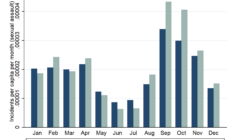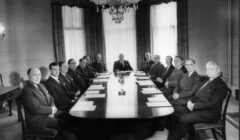 Paul Seabright, The War of the Sexes: How Conflict and Cooperation have Shaped Men and Women Prehistory to the Present, Princeton University Press, published May 2012 (eBook April 2012)
Paul Seabright, The War of the Sexes: How Conflict and Cooperation have Shaped Men and Women Prehistory to the Present, Princeton University Press, published May 2012 (eBook April 2012)
As countless love songs, movies, and self-help books attest, men and women have long sought different things. The result? Seemingly inevitable conflict. Yet we belong to the most cooperative species on the planet. Isn’t there a way we can use this capacity to achieve greater harmony and equality between the sexes? In The War of the Sexes, Paul Seabright argues that there is–but first we must understand how the tension between conflict and cooperation developed in our remote evolutionary past, how it shaped the modern world, and how it still holds us back, both at home and at work.
Drawing on biology, sociology, anthropology, and economics, Seabright shows that conflict between the sexes is, paradoxically, the product of cooperation. The evolutionary niche–the long dependent childhood–carved out by our ancestors requires the highest level of cooperative talent. But it also gives couples more to fight about. Men and women became experts at influencing one another to achieve their cooperative ends, but also became trapped in strategies of manipulation and deception in pursuit of sex and partnership. In early societies, economic conditions moved the balance of power in favor of men, as they cornered scarce resources for use in the sexual bargain. Today, conditions have changed beyond recognition, yet inequalities between men and women persist, as the brains, talents, and preferences we inherited from our ancestors struggle to deal with the unpredictable forces unleashed by the modern information economy.
Men and women today have an unprecedented opportunity to achieve equal power and respect. But we need to understand the mixed inheritance of conflict and cooperation left to us by our primate ancestors if we are finally to escape their legacy.
Visit the book’s homepage at Princeton University Press.
Buy on Amazon.
See press and reviews
Endorsements:
“From the mating habits of praying mantises to the battlefield of corporate boardrooms, Paul Seabright takes us on a fantastic journey across time and disciplines to uncover why–and how–men and women have learned to work together, and what forces still keep them apart in modern society.”–Linda Babcock, coauthor of Women Don’t Ask: The High Cost of Avoiding Negotiation–and Positive Strategies for Change
“The War of the Sexes is a delight to read. Paul Seabright launches a charm offensive on those who would prefer not to think that gender differences have any biological basis, and an intellectual offensive on those who think that these differences are large and intractable.”–Terri Apter, author of Working Women Don’t Have Wives
“Come on a journey from the Pleistocene to the present–a fascinating trip that uses the economic causes and consequences of our reproductive choices to explain relations between men and women through the ages. I recommend this book to anyone interested in the battle of the sexes (which is certainly everyone I know!—-it’s a great read.”–Anne C. Case, Princeton University
Translation rights: Held by Princeton University Press. For all enquiries please contact kwilliams@pupress.co.uk










